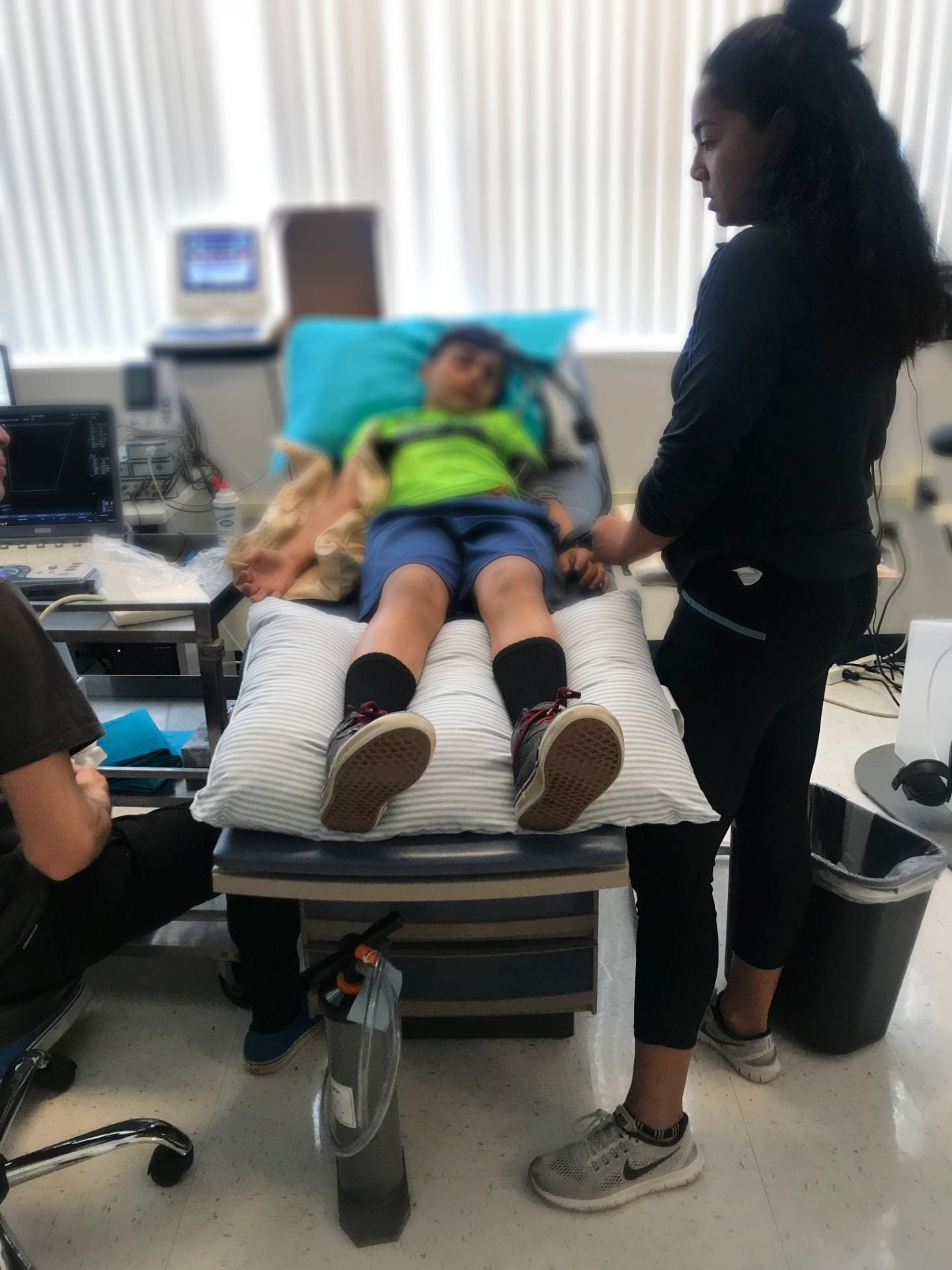
Kauionalani Kekuawela, right, of the College of Health and Human Sciences, works with a patient. She presented her study “Differential Cardiovascular Responses to Acute Exercise in Children” at the SJSU Student Research Competition Feb. 26 and is one of a dozen Spartans who will represent SJSU at the CSU Student Research Competition in April.
By David Goll
Described as one of the strongest field of competitors in several years, San Jose State University will be sending the maximum number of student researchers allowed per campus to the California State University Student Research Competition in April. The finalists include two teams of two students each as well as eight individuals who will compete against hundreds of students from across the system for top honors.
“We had some very strong presentations this year,” said Gilles Muller, associate dean of Research for SJSU’s Office of Research. The finalists made pitches to a panel of faculty judges Feb. 26 and 27 at the Dr. Martin Luther King Jr. Library as part of SJSU’s Student Research Competition.
This year marked the 40th anniversary of SJSU’s campus competition, with individuals and student teams competing from five colleges in five categories. This year, the discipline categories included Biological and Agricultural Sciences; Health, Nutrition and Clinical Sciences; Physical and Mathematical Sciences; Engineering and Computer Science; and Business, Economics and Public Administration.
Richard Bridges, a graduate student in the SJSU College of Health and Human Sciences, is among the students moving onto the CSU-wide competition. He presented his project, titled “Tertiary Treatment of Hepatitis C as Prevention for End Stage Liver Disease: A Qualitative Study Examining the Barriers and Facilitator to Treatment of Chronic HCV Among Current and Former Intravenous Drug Users”. His faculty mentor was Dr. Monica Allen.
Conducting his research among a group of nine black men in San Francisco’s Bayview district, Bridges wanted to investigate reasons for the sharp increase in deaths related to Hep C noted nationally by the Centers for Disease Control and Prevention between 2003 and 2013, and what type of barriers people of color, some of whom contract the disease through intravenous drug use, face in trying to obtain treatment, among other issues.
One barrier that Bridges discovered was a concern by health insurers and providers that drug users could be reinfected after treatment. One of the faculty judges asked Bridges if he found many studies on the subject already available.
“There has been very little research into this disease among this population, and it’s because of the stigma of IV drug use,” he said. “The population in my study does not get the press.”
He added that a new emphasis is being put on the disease by big pharmaceutical companies given its prevalence among baby boomers, those born between 1946 and 1964, most of whom are assumed to have health insurance.
Another team of student researchers who made the cut were Jobelle Peralta and Blake DuPriest, students in the College of Science. Dr. Bree Grillo-Hill served as faculty mentor for the project titled “A New Paradigm for Regulation of Cell Death by Intracellular pH Dynamics in the Fly Eye.”
The pair used cells from the eyes of the insect to assess how the levels of acidity and alkalinity could determine whether those cells would remain healthy or become cancerous. They also examined the causes of cell death in the fly so they could devise strategies to block those causes.
“We were surprised by the results, but that is science,” Peralta said. “You’re always surprised by the results.”
Other finalists in the SJSU competition heading to Fullerton for the competition on April 26 and 27 include:
- Eric Anderson, Charles W. Davidson College of Engineering, — “Can 3D Printing Compete with Mass Production: A Mechanical Reliability Approach.” Faculty Mentor: Ozgur Keles
- Sky Eurich and Shivangi Agarwal, Charles W. Davidson College of Engineering — “Takeover Response Times Following Disengagements in Semi-Autonomous Vehicles.” Faculty Mentor: Francesca M. Favaro
- Avni Gulati, Charles W. Davidson College of Engineering — “Social Recommendation Systems.” Faculty Mentor: Magdalini Eirinaki
- Sambhav Gupta, Lucas College and Graduate School of Business — “Artificially Intelligent (AI) Tutors in the Classroom: A Needs Assessment Study of Designing Chatbots to Support Student Success.” Faculty Mentor: Yu Chen
- Vanshika Gupta, College of Science — “Investigating Macromolecular Structures for the Transformation of Greenhouse Gases Into Liquid Fuels.” Faculty Mentor: Madalyn Radlauer
- Kauionalani Kekuawela, College of Health and Human Sciences — “Differential Cardiovascular Responses to Acute Exercise in Children.” Faculty Mentor: Areum Jensen
- Sarah Ortega, Charles W. Davidson College of Engineering — “Exploring a Hybrid Design for a Short to Medium Range Transport Aircraft.” Faculty Mentor: Nikos Mourtos
- Noe Vidales, College of Science — “Clustering Mixed Type Data Sets Using Probability Distance Clustering and Gower’s Metric.” Faculty Mentor: Cristina Tortora
